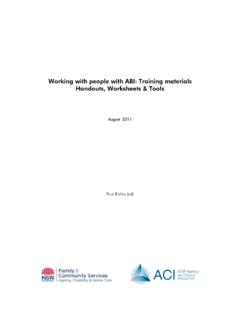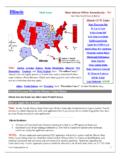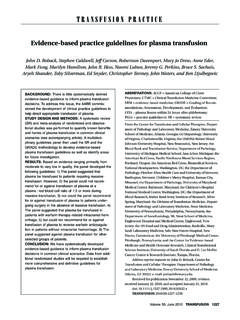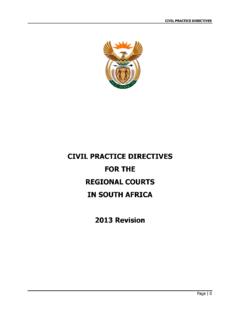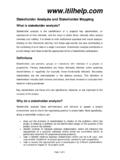Transcription of 7 Phases of Case Management - abistafftraining.info
1 case Management Practice Guide7 Phases of case Management Version Community Access Ageing, Disability and Home Care, Department of Human Services NSW March 2010 Final Document approval The case Management Practice Guide 7 Phases of case Management has been endorsed and approved by: Lauren Murray Deputy Director General, ADHC Approved: 29 March 2010 Signature on file Peter De Natris Executive Director, ADHC Approved: 21 December 2009 Signature on file Document version control Distribution: Community Access Teams Document name: case Management Practice Guide - 7 Phases of case Management Version: Document status: Final File name: case Management Practice Guide Authoring unit: Community Access Date: March 2010 Version March 2010 Table of contents 1 1 2 Phases of case Management .
2 3 3 Practice 7 Practice 11 Types of Practice 16 Practice Monitoring .. 18 Practice 19 Practice 22 Practice Guide 25 Version March 2010 1 Introduction The Practice Guide This practice guide is a companion document to the case Management Practice Policy 2009 and is designed to support and guide case managers working in Community Access Teams in their every day practice. The guide is based on the 7 Phases of case Management practice as outlined in the case Management Framework. This practice guide is not prescriptive but provides endorsed examples of practice points and tools for case managers to assist them to implement the case Management Policy 2009.
3 case Management practice can be brief and intense but can also be delivered over a long period. Regardless of its duration, case Management practice should move through all seven Phases , although sometimes Phases will happen simultaneously. This practice guide should be used in conjunction with a range of policies and procedures relevant to case managers. Its application in practice should be supported through line Management and practice supervision from your access manager and any coaching or mentoring you may receive in your role as case manager within Ageing, Disability and Home Care, Department of Human Services NSW (ADHC). The 7 Phases of case Management The 7 Phases of case Management are: case Management practice in all Phases should be based on the principles outlined in the case Management Practice Policy 2009.
4 It is important to note that whilst it is useful to describe the activities of case Management by categorisation into seven distinct Phases , case managers need to be aware that case Management is not a linear process and activities and Phases often overlap. case Management should be a seamless process for people with a disability. ADHC promotes a person centred approach to all its work with people with disability and their families and / or carers. case Management practice will have a different emphasis and focus in circumstances where the person with a disability is a child. A family centred approach will be critical in understanding the needs of a child or young person. Refer to Keeping Families Together Framework for further information.
5 case Management Practice Outcomes The expected outcome of case Management practice is to maximise opportunities for a person with a disability to achieve their goals, and chosen quality of life ( case Management Practice Policy ). This is achieved by individualised planning and support coordination. One of the key principles of case Management practice is to minimise the intrusiveness and involvement of formal support services in the life of a person with a disability and to work with person with a disability to create opportunities for their Version March 2010 1 participation in their community which are rewarding, respectful and valued by the person with a disability and other community members ( case Management Practice Policy, ) Working with Others case Management in ADHC is not offered in isolation from other supports that the person with a disability may be receiving.
6 case managers will work alongside staff from many disciplines, agencies and organisations. This may include therapists, respite coordinators and people who provide the informal supports to the person with a disability. Whilst it is important to build collaborative relationships with all stakeholders involved, it is essential that these relationships maximise participation of the person with a disability. Conversations need to be with the person rather than about the person to reflect a person centred approach. Information Exchange Information shared with others needs to be accurate, relevant and with the explicit consent of the person with disability or their consent giver. Consent for the disclosure, gathering or exchange of information must be obtained in writing.
7 The full policy is available at Decision Making and Consent Policy and Procedures. Children and young people Chapter 16A of the Children and Young Persons (Care and Protection) Act 1998 (The Act) helps clear the way for better interagency information exchange provisions. Government and non-government agencies (known as prescribed bodies ) can exchange information with each other that relates to a child or young person s safety, welfare or wellbeing, whether or not the child or young person is known to Community Services. As per section 245G of the Act, a person who provides information in good faith in accordance with Chapter 16A, will not be liable for providing this information ADHC is a prescribed body under Chapter 16A, which means that it can request and provide information to other prescribed bodies under Chapter 16A without the need for the consent of the child, young person or family.
8 However, it is best practice for ADHC staff to inform a child, young person or their family that information about them may be provided to another organisation if needed, but only if: it will not jeopardise a child/young person s safety, welfare or wellbeing it will not place the worker or child/young person at risk, and/or you are unable to contact a parent/carer, and the matter is urgent. A fact sheet on information exchange has been developed for ADHC staff in relation to information exchange. Further information regarding information exchange can also be found in ADHC's Child Protection Policy 2010. Although Chapter 16A applies to the exchange of information between prescribed bodies, section 248 will still apply to the exchange of information concerning statutory cases between Community Services and other relevant human services and justice agencies and non-government organisations.
9 Reflective Practice Reflective practice is a process where the individual thinks through a series of actions or activities to identify positive and negative elements contributing to any situation in which they have been involved or have observed. These elements can include, but are not confined to, the following: Relationships Version March 2010 2 Feelings Experiences Events Context Actions Values and belief system Culture The process can have two key components: Reflecting on the knowledge you have about people and events or outcomes. Using the knowledge to inform subsequent thinking, actions and practice. Reflective practice is a critical component of good case Management practice and can occur in a range of situations including individual problem solving and analysis, informal discussions with others such as colleagues, students, and academics in the same and different disciplines.
10 It is an integral part of good supervision in which joint exploration of some of the issues arising in practice should be encouraged in an environment of safety and shared learning. It is in conversation with others that ideas are challenged, new approaches and perspectives can be considered, and notions of what is possible and what is 'good practice' are developed and shared. The process involves problem solving from a point of having knowledge and understanding about something and applying analysis to this knowledge to inform future thinking and actions. It is an ongoing process in which an individual case manager can draw on both the current situation and previous experiences to explore possible future action and consider the relative merits of any particular approach.
